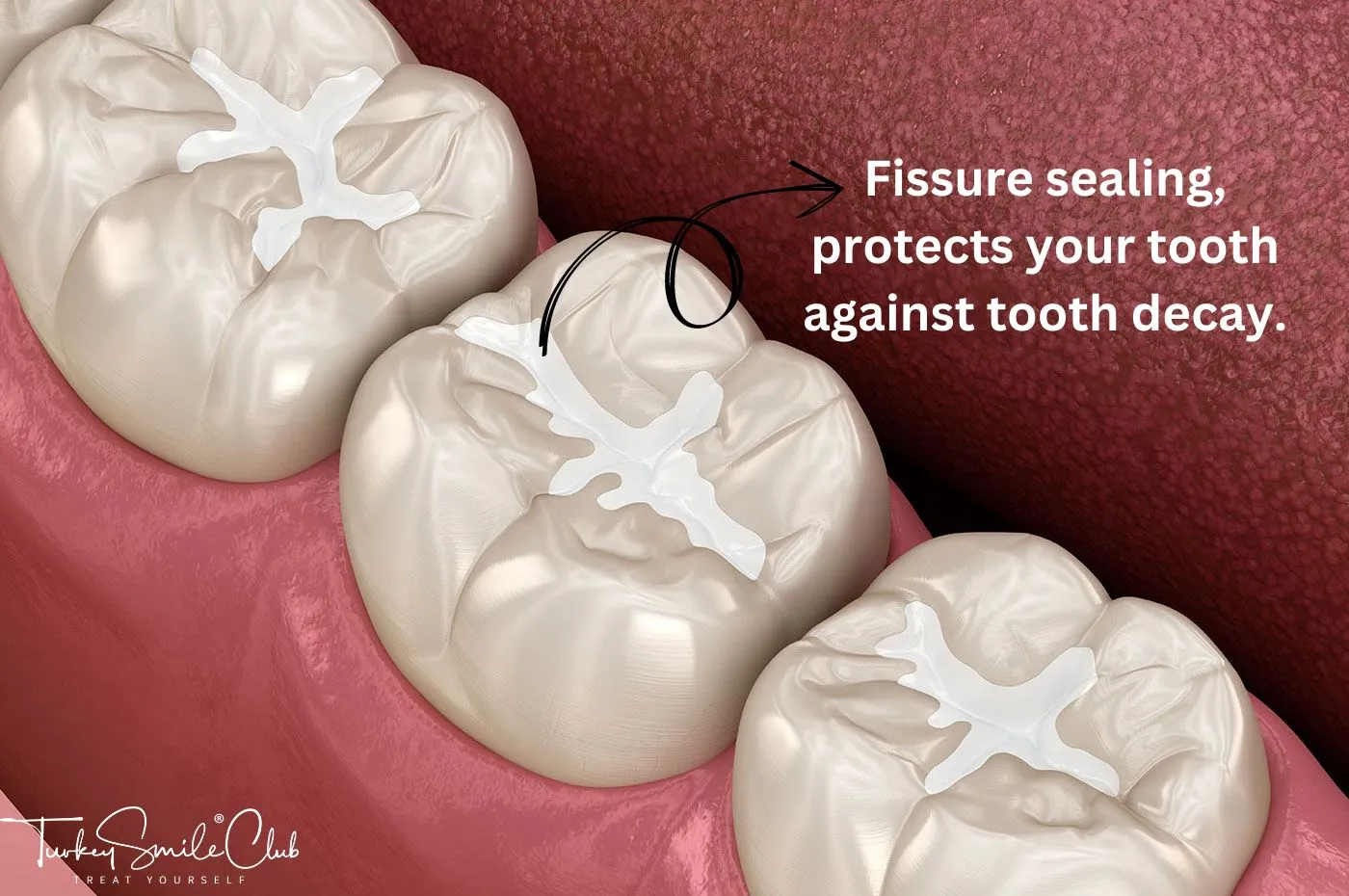
Fissure sealing: Protecting your teeth from decay
Fissure sealing in Turkey
Fissure sealing treatment in Antalya, Turkey is a treatment applied to prevent dental caries, especially in children.
Fissure sealant is a treatment method to protect the grooves and pits on the chewing surfaces of the teeth to prevent tooth decay. Turkish dentists use advanced techniques and materials when applying fissure sealants, ensuring long-lasting protection.
What is fissure sealing?
Fissure sealing involves applying a thin, protective coating, typically made of resin, to grooves and pits in teeth that are prone to plaque build-up and decay.
This is effective for molars and premolars with deep fissures that are difficult to clean with a toothbrush. By sealing these areas, it helps prevent the onset of tooth decay and maintains overall oral health. The treatment is quick, painless and significantly reduces the risk of future dental problems.
When are fissure sealants needed?
It is used when caries has not yet formed, but there are initial abrasions.Since tooth decay is intervened in the first stage, it prolongs the life of the tooth.
- If an adult does not yet have a decayed tooth, but has had dental problems in the past,
- Individuals with special needs who have difficulty maintaining good oral hygiene,
- It is recommended that children receive a fissure sealant when their first and second permanent molars erupt, at about 6 and 12 years of age.
Fissure sealant procedure
Fissure sealant application begins with complete cleaning of the tooth surface from plaque or food residues. After the tooth is cleaned and dried, an acidic solution is applied to the chewing surface of the tooth. The acidic solution slightly roughens the enamel so that the sealant adheres better. After a few seconds, the acidic solution is rinsed off and the tooth is dried again.
The dentist then carefully applies the liquid fissure sealant to the recesses and ridges of the tooth. Using a special light, the sealant is hardened and the fissure sealant adheres firmly to the enamel.
Fissure sealant treatment is an easy, non-invasive and cost-effective method to maintain dental health. Regular dental check-ups ensure that the sealants remain intact and continue to provide protection.
Fissure sealing benefits
Research suggests that fissure sealing is an important treatment to maintain dental health in later years.
Protection Against Caries
The fissure sealant forms a barrier on the tooth surface, preventing harmful bacteria and food debris from settling in the grooves. This reduces the risk of tooth decay and the need for future dental treatments such as fillings or crowns.
Painless and Non-Invasive Procedure
The procedure is painless and non-invasive. It does not require drilling or modification of the tooth structure. It can be completed in a single visit, providing immediate protection.
Cost Effective Preventive Care
By preventing cavities, it reduces the need for more extensive and expensive dental procedures in the future. This makes it an economical choice for long-term dental care, especially for families with children.
Long Term Protection
Fissure sealing protects your teeth against tooth decay for several years.
Fissure sealing risks
Fissure sealant is generally safe, but there is a possibility of bacteria accumulating under the sealant. This is rare with correct application. For this reason, you should always go to a dentist you trust for all procedures.
Fissure sealing alternatives
The most commonly used alternative is fluoride treatments. It strengthens tooth enamel and helps prevent cavities by making teeth more resistant to acid attacks by bacteria.
Another alternative is composite resin fillings, which are used when small cavities occur. These fillings not only repair the tooth, but also protect against further damage.
In conclusion, consulting a dentist will help determine the most suitable option for maintaining strong and healthy teeth.
.
How long does a fissure sealant last?
Fissure sealants can last for several years, but may require touch-ups from time to time. Regular dental check-ups ensure that the sealant remains intact and continues to protect your teeth.
To whom is fissure sealing applied?
Fissure sealant is applied to children. It can also be useful for adults. Anyone with deep grooves or pits in their teeth is a candidate.
Fissure sealing teeth adults
Although it is identified with children, fissure sealant application is also used for adults. It is especially useful for adults who have not developed caries in their molars and want to protect their oral health.
Fissure sealing children's teeth
For these children who are just learning to care for their teeth, fissure sealing provides a preventive treatment.
Fissure sealant price
The price of fissure sealant varies between €10-€40 in Turkey. All dental treatments in Turkey are much more affordable than in Europe.
Factors such as the location of the dental clinic, the experience of the dentist and the number of teeth treated are effective in determining the cost of treatment.
Some clinics offer discounts for multiple teeth or package deals for families.
Considering the potential to save money on future dental treatment costs, it is a good investment.
Fissure sealant vs filling
While a fissure sealant is a preventive treatment, a filling treats existing caries.
Sealants provide protection before caries occurs, whereas filling repairs damage after it has occurred.
Sealants are less invasive and preserve more of the natural tooth structure.
This content is for informational purposes only and is not a substitute for professional dental advice. It is important to consult a dentist for the most accurate information and treatment options regarding your dental health.
For more detailed information, visit Turkey Smile Club and contact us.